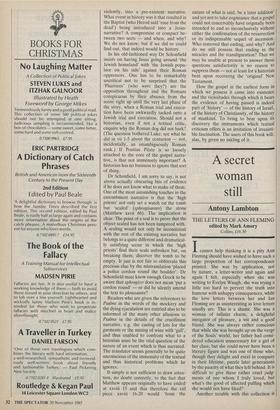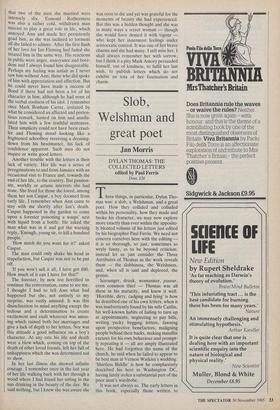A secret woman still
Antony Lambton
THE LETTERS OF ANN FLEMING edited by Mark Amory
Collins, £16.50
Icannot help thinking it is a pity Ann Fleming should have wished to have such a large proportion of her correspondence printed. She was by application, not by nature, a letter-writer and again and again I felt, especially when she was writing to Evelyn Waugh, she was trying a little too hard to pervert the truth into humour with unhappy consequences, while the love letters between her and Ian Fleming are as uninteresting as love letters usually are. This is a shame. She was a woman of infinite charm, a delightful instigator of pleasure, a wit and a good friend. She was always rather conscious that while she was brought up on the verge of the Souls' world, her father had consi- dered education unnecessary for a girl of her class; but she could never have been a literary figure and was one of those who, though they delight and excel in company in their lifetime, puzzle later generations by the paucity of what they left behind. It is difficult to give these rather cruel judg- ments of one whom I truly loved, but what's the good of affected puffing which she would not have liked?
Another trouble with this collection is that two of the men she married were intensely shy. Esmond Rothermere was also a rather cold, withdrawn man miscast to play a great role in life, which annoyed Ann and made her persistently goad him, as she was inclined to torment all she failed to admire. After the first flush of her love for Ian Fleming had faded she treated him in the same way. His reactions in public were anger, annoyance and bore- dom and I always found him disagreeable. Perhaps my feeling was unfair as I never saw him without Ann; those who did spoke of him with appreciation and affection. But he could never have made a success of Bond if there had not been a lot of his character in him, although he had none of the verbal coolness of his idol. I remember once Mark Bonham Carter, irritated by what he considered an affected and preten- tious remark, turned on him and annihi- lated him with a few truthful sentences. Their simplicity could not have been cruel- ler and Fleming stood looking like a frightened schoolboy receiving a dressing- down from his headmaster, his lack of confidence apparent. Such men do not inspire or write good letters.
Another trouble with the letters is their lack of variety. Her life was a series of peregrinations to and from Jamaica with an occasional visit to France and, towards the end of her life, to the country. But passion- ate, worldly or artistic interests she had none. She lived for those sheloved, among them her son Caspar, a boy doomed from early life. I remember when Ann came to stay with me shortly after Ian's death. Caspar happened in the garden to come upon a forester poisoning a wasps' nest with liquid from a bottle. He asked the man what was in it and got the warning reply,.'Enough, young sir, to kill a hundred people.'
'How much do you want for it?' asked Caspar.
The man could only shake his head in stupefaction, but Caspar was not to be put off.
'If you won't sell it all, I have got £60. How much of it can I have for that?'
The forester, by now too horrified to continue the conversation, came to see me.
I thought I had to tell Ann what had happened but she, not entirely to my surprise, was vastly amused. It was this disinclination to mind anything except the tedious and a determination to create
excitement and exalt whatever was amus-
ing which ruined both her marriages and give a lack of depth to her letters. Nor was this attitude a good influence on a boy's character. At any rate his life and death were a blow which, coming on top of the death of other loved friends, left her full of unhappiness which she was determined not to show.
In her last illness she showed infinite courage. I remember once in the last year of her life walking back with her through a wood where I had found her sitting in the sun drinking in the beauty of the day. We said nothing, but I knew she was aware she was soon to die and yet was grateful for the moments of beauty she had experienced. But this was a hidden thought and she was in many ways a secret woman — though she would have denied it with vigour — who kept her innermost feelings under aristocratic control. It was one of her brave charms and she had many. I still miss her, I shall always remember her with sorrow, but I think it a pity Mark Amory persuaded himself, out of kindness, to fulfil her last wish, to publish letters which do not exhibit an iota of her fascination and charm.



























































 Previous page
Previous page